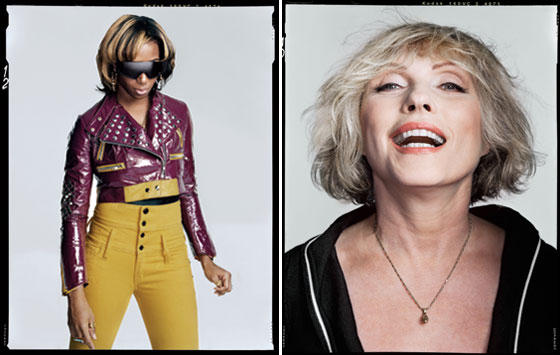 |
Santogold and Debbie Harry
(Photo: Dan Winters) |
Debbie Harry is still a young punk: Dressed in a loose floral dress and Converse sneakers, she pouts a little while waiting for Santogold to put on an elaborate purple leather jacket and lime-green hot pants, then carefully pack up a suitcase’s worth of clothes after her photo shoot. But the classic rock icon and the flashy emcee have more in common than meets the eye: Both make power pop out of the hip sounds of their era, both became famous in their early thirties, and both, they discover, are ambivalent about the way New York’s music scene has changed over the years.
New York: Blondie is beloved for classic pop singles, but in the mid-seventies the band felt like an upheaval, right?
Debbie Harry: Yeah, before our time the trend was toward bigger bands, like Lynyrd Skynyrd and the Eagles, and you didn’t hear a lot of pop music with girls in it. It was a man’s world—the good ol’ boys chugging their guitars. So we were really counterculture. And urban. We were incorporating new technologies, sounds, ethnicities—just jamming it all together.
Santogold: It was the music from the late seventies and early eighties that moved me to make music in the first place. Punk just stripped all that big, theatrical rock from bands like Led Zeppelin and the Doors. It was just raw energy. And that’s what I relate to—bands like the Ramones who can hardly play anything. I can hardly play anything!
DH: You know, that’s all art is: a gradual build and layering of influences and tastes. It’s like pollination.
S: I feel like out of the whole punk thing, you did what I’ve been striving to do, which is bring a pop element to it. You wrote real songs, with melodies. When I listened to your songs when I was younger, I felt like they were fifties-esque, but twisted into a stripped-down, raw thing. You did that with fashion, too. You’ve got that total punk thing, with the Sex Pistols and stuff, and then the whole glam-rock thing, with David Bowie and everybody. You made a tough, badass, not girly but still feminine look.
NY: Debbie, you helped create room for women in pop music. How have things changed since then?
DH: There’ve always been two schools of thought when it comes to female artists. There’s the serious guitar players who have stuff to say, and they’re called “women.” And then there’s the producer-driven, girl-group, hair-toss, flaunt-your-tits-and-ass kind of act.
S: The producers phenomenon is one of the reasons music has gone downhill. When I was a teenager, every hip-hop artist had their own D.J., who was their producer. From Public Enemy to A Tribe Called Quest, everyone had a different sound. Now? Now it’s only hip-hop, pop, and rock. You’ve got three producers who do everything. And as far as the women go, I think there are very few big-time women right now who are running their own show, like Björk, M.I.A., and Karen O. It’s all American Idol.
DH: The best part about American Idol is when they have the auditions.
S: I agree.
DH: That’s all they should do.
NY: Has New York priced itself out of a music scene?
S: I’m from Philly, but I’ve lived in Brooklyn for about eight years. It’s funny: It wasn’t until I moved here that I met a lot of my really good friends from Philly. Because everybody comes to New York. It’s just where stuff jumps off.
DH: That’s always why people would come to New York. It’s a communications hub.
S: Totally. But you can’t live here and just be an artist unless you’re gonna be so broke. I moved back to Philly for a while and would come to New York three times a week, because I don’t want to be that broke. A lot of artists do that these days—they start off elsewhere, then move to Williamsburg, and then keep moving because it’s so expensive. In fact, most of the people in the scene I’m said to be in don’t really live here. There’s not a scene like there was back in your day.
DH: I don’t think the economic conditions permit it.
S: And the city doesn’t value it. I mean, look what they did to CBGB!
DH: The whole Lower East Side looks like a prison farm to me. All those dorms that NYU put up—they’ve gotten away with murder.
NY: Is there still a distinctive New York sound?
DH: The thing that’s sad about the role New York now plays in the world is that everything is everywhere, and it’s becoming very much the same. All the major cities in the Western world have become gentrified and homogenized. There’s nothing you can buy only in New York. Back in the seventies, the city was chaotic and poor. My clothes came out of the garbage—I went shopping on the street. Nobody had dough to afford their own equipment. You would borrow a guitar and amp, and if you had them you fucking held onto them like there was no tomorrow.

